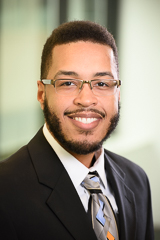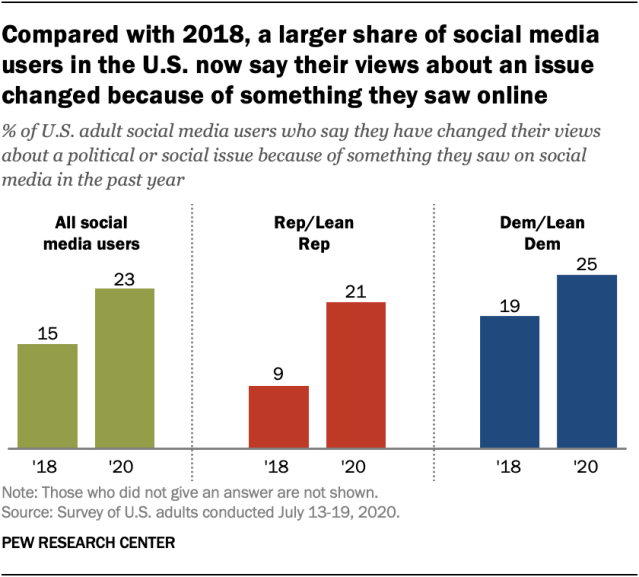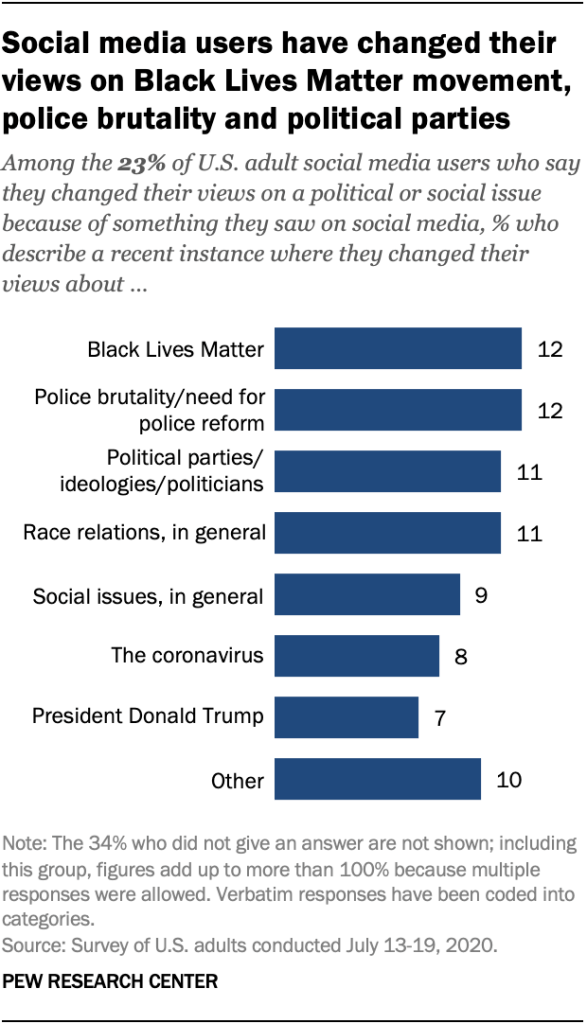Roughly a quarter (23%) of adult social media users in the United States – and 17% of adults overall – say they have changed their views about a political or social issue because of something they saw on social media in the past year, according to a July Pew Research Center survey.
The share of social media users who say they have changed their views on an issue has increased since the Center last asked this question in 2018 (23% now vs. 15% then). And when asked to elaborate on the things they have changed their views about, these adults often mention the Black Lives Matter movement and police brutality. They also mention changes in their views about political parties, ideologies and political figures.
Pew Research Center conducted this study to understand how Americans think about the effectiveness of social media as a tool for social and political activism, change and engagement. For this analysis, we surveyed 10,211 U.S. adults from July 13 to 19, 2020. Everyone who took part is a member of the Center’s American Trends Panel (ATP), an online survey panel that is recruited through national, random sampling of residential addresses. This way nearly all U.S. adults have a chance of selection. The survey is weighted to be representative of the U.S. adult population by gender, race, ethnicity, partisan affiliation, education and other categories. Read more about the ATP’s methodology.
This survey includes a total sample size of 298 Asian Americans. The sample includes English-speaking Asian Americans only and, therefore, may not be representative of the overall Asian American population (75% of our weighted Asian American sample was born in another country, compared with 77% of the Asian American adult population overall). Despite this limitation, it is important to report the views of Asian Americans on the topics in this study. As always, Asian Americans’ responses are incorporated into the general population figures throughout this report. Because of the relatively small sample size and a reduction in precision due to weighting, we are not able to analyze Asian American respondents by demographic categories, such as gender, age or education.
Here are the questions used for this report, along with responses, and its methodology.
Social media users who identify as Democrats and independents who lean toward the Democratic Party are slightly more likely than their Republican and GOP-leaning counterparts to say they have changed their views on an issue because of something they saw on these platforms (25% vs. 21%). The same pattern appeared in 2018, but the gap has narrowed to 4 percentage points from 10 points then.
There are also differences today by race, ethnicity and age. For instance, Asian American (29%), Black (28%) and Hispanic social media users (28%) are more likely than their White counterparts (20%) to say they have changed their views on a political or social issue. And 34% of social media users ages 18 to 29 say they have done this, compared with 23% of those 30 to 49, 20% of those 50 to 64 and 13% of those 65 and older.
Still, a majority of U.S. social media users (76%) say they have not changed their views on a political or social issue because of something they saw on social media in the past year. This is down from 84% in 2018.
These findings add to the picture of Americans’ wide-ranging views about social media. For instance, a majority of Americans say social media have a mostly negative effect on the way things are going in the country today. At the same time, many U.S. adults say they recognize both the positive and negative impacts of social media sites. Majorities say social media activity highlights important issues that may not get a lot of attention otherwise and that social media distract people from issues that are truly important.
As part of the July survey, the Center asked social media users who say they have changed their views about a political or social issue because of something they saw to describe a recent instance when this took place. Some 12% of these adults say they changed their views – either positively or negatively – about the Black Lives Matter movement or about police brutality and the need for police reform. (The responses below are lightly edited for spelling, style and readability.)
“Reading articles on the BLM movement has opened my eyes to the degree of systemic racism in this country and the world.” –Woman, 64
“I used to support BLM, but now I see them as violent domestic terrorists not interested in addressing the real problems within the Black community. BLM is about a communist revolution not about helping the Black community…” –Man, 50
“I never thought much about defunding or abolishing the police but after seeing social media posts, I’ve researched and read up on the topics and now believe in fairly substantial cuts to police funding.” –Woman, 31
A similar share of social media users (11%) say they changed their views about race relations in general – such as racism and discrimination – or about political parties, ideologies or politicians.
“I have become more aware of systematic racism and the reasons for protests and riots.” –Woman, 37
“My views for the left and right changed. I found that both sides have bad people. Makes me wish there was a third party.” –Man, 31
Some adults also say they changed their views about other social issues, such as LGBT rights, immigration, equality and feminism (9%); the coronavirus outbreak and related guidelines (8%); and President Donald Trump (7%).
“I read information about trans and LGBTQ persons, and scholars in particular, and it changed my view on this population and on the social issues they experience.” –Man, 49
“I initially was very dismissive of COVID and felt the government/others were over-reacting to what seemed like a big flu. The more I learned about it, primarily through social media, the more seriously I took it.” –Woman, 45
“I wasn’t even considering voting for Donald Trump in November, but after seeing so many people I respect sharing reasonable thoughts in favor of Trump and the things he has actually done for our country, I’m now somewhat considering voting for him.” –Man, 24
Note: This is part of a series of blog posts leading up to the 2020 presidential election that explores the role of social media in politics today. Here are the questions used for this report, along with responses, and its methodology.
Other posts in this series:

"social" - Google News
October 15, 2020 at 11:03PM
https://ift.tt/3773Y48
23% of users in U.S. say social media led them to change views on an issue; some cite Black Lives Matter - Pew Research Center
"social" - Google News
https://ift.tt/38fmaXp
https://ift.tt/2WhuDnP
Bagikan Berita Ini
















0 Response to "23% of users in U.S. say social media led them to change views on an issue; some cite Black Lives Matter - Pew Research Center"
Post a Comment